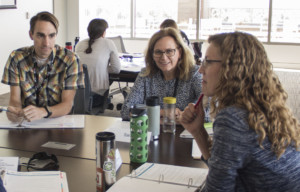 “With my legal training and forty years of litigation practice, I came to the environmental dispute resolution short course a doubting Thomas, not entirely convinced that collaboration would be a useful tool in resolving the types of environmental disputes that typically end up in a courtroom.”
“With my legal training and forty years of litigation practice, I came to the environmental dispute resolution short course a doubting Thomas, not entirely convinced that collaboration would be a useful tool in resolving the types of environmental disputes that typically end up in a courtroom.”
Scott Berry, board chair, Wild Utah Project
The quote above comes from a soon-to-be graduate of the 2017 short course on effective natural resources collaboration. Scott and his cohort will attend their final session on April 12, 2018 and walk away with a certificate of completion; CLE and/or AICP credit; a network of new friends and collaborators; and a capstone project that applies what they learned to a real-life challenge of their choosing. Scott and his colleagues will also leave with a new appreciation for collaboration, having learned that collaborative processes are (in Scott’s words) a “viable option for approaching the wicked conflicts generated in the environmental arena.”
As we usher our second cohort toward short course graduation, we invite all “doubting Thomases,” “converts to collaboration,” and everyone in-between to apply for the 2018 short course on effective natural resources collaboration. We are currently accepting applications through March 26, 2018, and anticipate selecting and notifying short course participants by April 9, 2018. The 2018 short course will be held at the S.J. Quinney College of Law, with the first session on June 28-29.
Over the course of six two-day sessions, participants will learn the art and science of collaborative problem-solving through a mix of lectures, case studies, peer-to-peer sharing, discussion, and simulation exercises. Short course faculty will also provide mentorship and coaching to each participant as they design and implement an environmental and natural resource collaboration capstone projects to address an issue they encounter at work or in their community.
All short course graduates will become part of the EDR Fellows network. Participants have consistently told us that interacting with their fellow students is as important as the classwork, so we created the network to facilitate and foster those relationships beyond the classroom. Fellows mentor and coach future collaborative projects and receive invitations to EDR program events, such as our quarterly Dialogues on Collaboration.
We will select participants representing a range of stakeholder groups to foster robust dialogue and peer-to-peer learning. Ideally, the 2018 class will include representatives of all levels of government (local, state, federal, and regional), industry, advocacy organizations, tribes, consultants, and community members from around Utah, as have our first two cohorts. The Wagner Charitable Foundation has generously provided scholarship funding to help us ensure the stakeholder diversity of our third short course cohort.
Here’s what other members of the 2017 cohort say about the short course:
I regulate uranium mills for the State of Utah, Department of Environmental Quality, Division of Waste Management Control. Uranium is a very controversial subject and I am very uncomfortable with “huggy,” “touchy-feely,” and emotional things. However, I do recognize the importance of trust and effective communication in regulatory work. This course has given me insight and tools on how I can improve my communication skills and build trust with the stakeholders that I work with.
Ryan Johnson, environmental scientist/health physicist,
Utah Division of Waste Management and Radiation Control
I have found the principles of interest-based, mutual gains negotiation to be immensely valuable in my work as Grand County, Utah’s, Community and Economic Development Director. The EDR staff have created a course curriculum and educational environment where theory, case-study, role-play, and practice come together for a rich learning experience. I would recommend the course for any professionals who work on complex issues with diverse groups of stakeholders.
Zacharia Levine, community and economic development director, Grand County, Utah
The short course on effective natural resources collaboration has been an amazing opportunity for me as a professional. The practical skills and concepts presented are invaluable for work settings as well as in life situations—not to mention the tremendous value in developing a peer to peer networking group.
Jeff Lachowski, senior engineer, Rio Tinto
This class is very well organized and exposes you to highly experienced facilitators. A massive amount of information and experience over a short period – well worth your time and money. Highly recommended for anyone working in natural resources and group dynamics.
Jared Parkinson, attorney, Water Law PC
 Katherine Daly is the program manager of the Environmental Dispute Resolution (EDR) program at the Wallace Stegner Center, S.J. Quinney College of Law, University of Utah.
Katherine Daly is the program manager of the Environmental Dispute Resolution (EDR) program at the Wallace Stegner Center, S.J. Quinney College of Law, University of Utah.
